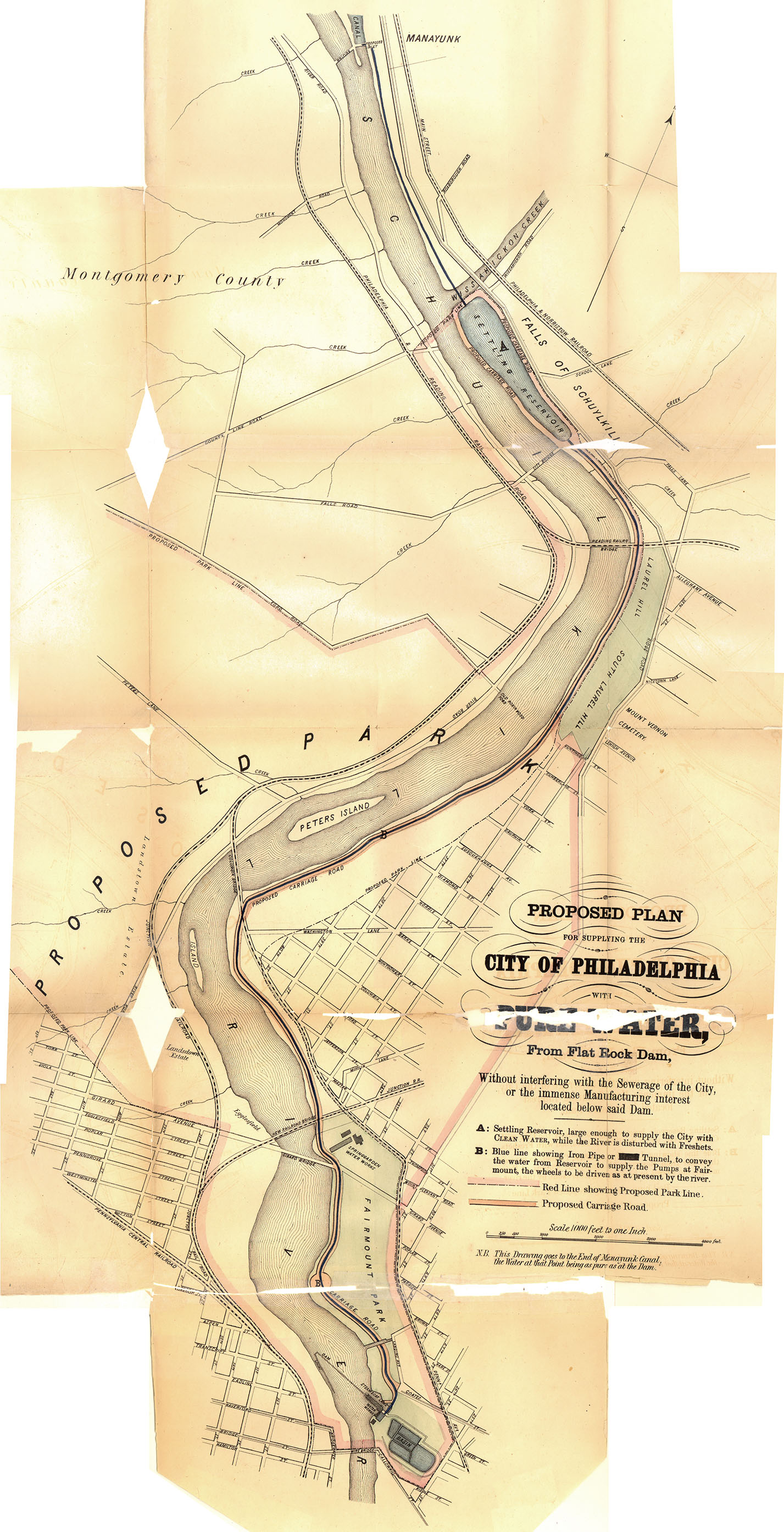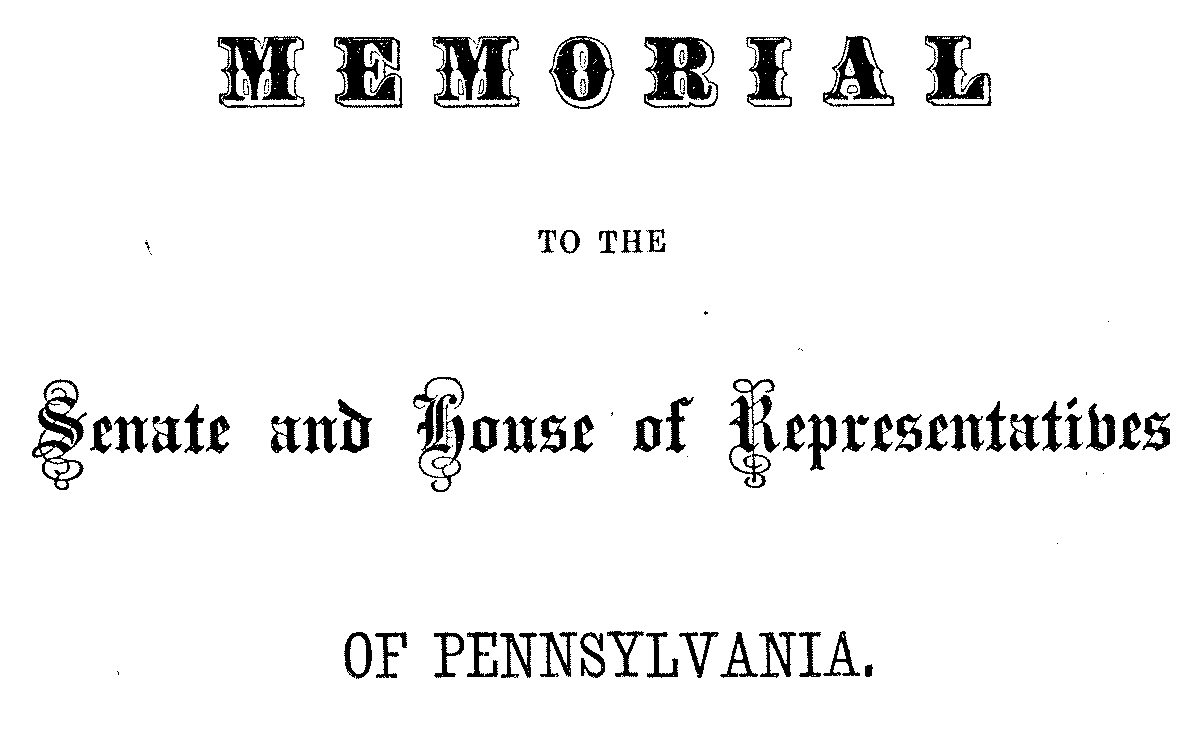Manufacturers along the Schuylkill River, in this self-serving petition, asserted their right to continue polluting the river with their wastes, and asked the state legislature to supply water to the city by piping it from above the Flat Rock Dam, at the head of the Manayunk Canal. An accompanying map gives a rough idea of the plan, which was rejected by the legislature.
As a newspaper editorial about the petition suggested, if the rights of the manufacturers to pollute the water supply came before the rights of the citizens for clean water, the pipeline would eventually have to be extended farther and farther upstream as the river became more and more polluted: “At this rate we will have to build waterworks at Pottsville [near the source of the Schuylkill River] in a few years.” Read the full transcript of this editorial below.


The Wholesale Poison Question
A committee of the manufacturers doing business along the line of the Schuylkill River, have addressed a petition to the Legislature against the bill which forbids the use of the river for sewage purposes from Norristown dam to Fairmount dam. The document is, in many respects, an extraordinary one, and the arguments advanced in behalf of the manufacturers will not bear the application of common-sense and common justice. The most cogent reason offered by the petitioners why they should still be permitted to use the river as a sewer, is, that the roughly estimated number of thirty thousand persons are dependent upon the offending factories for their support, and that Philadelphia has thirty-six million dollars capital invested in theses establishments. We fully admit, with the petitioners, the vast importance of this large interest, not only to the welfare of this great number of people, but to the industrial interests and the wealth of the city. But even allowing for a moment that the enforcement of the law would have the effect of ruining this interest, and of throwing all of these people out of immediate employment, no unprejudiced man would hesitate to say that it would be better to entail this disaster upon these communities, and to rob the city of the advantages gained by the investment of this capital, than to place in jeopardy the health of the million persons who form the population of Philadelphia, by poisoning the source of the water supply.
This manufacturing interest is not, as the petitioners assert, “as necessary to the growth and prosperity of the city as the supply of pure water is to the health of the inhabitants.” The first is a matter of dollars and cents; the other of life and death. If the manufacturers are driven from this locality, they will find other places in the vicinity of this city where they will continue their operations. But there is no necessity for either of these disastrous consequences. We long ago proposed to obviate the difficulty by compelling the manufactures to construct a system of sewage with which to drain the poisonous filth which flows from their establishments. This, the petitioners assert, cannot be done; they say that “no artificial drainage can be efficiently substituted for the natural bed of the Schuylkill River,” and yet in the very same article they propose that the great city of Philadelphia shall erect a series of iron pipes from Flat Rock Dam to Fairmount and procure water by this means. If the first proposition is not feasible, this one is manifestly absurd. If less than one hundred factories find it impossible to construct drains great enough to carry off their own refuse, how utterly impossible will it be for the city to carry a sufficient supply of water though a single iron pipe, or, indeed, though a dozen? The proposal of the petitioners has not the merit of common sense or common honesty.
The real position is just this: A few men plant themselves by the side of a stream, the water of which supports the life of one million human beings. Deliberately, they empty into that stream foul matter which, in large or small quantities, is taken into the stomachs of this great multitude of people. The manufacturers know this must be the case when they make the river their common sewer. When the representatives of the people undertake to legislate in their behalf, these gentlemanly Borgias come forward and say, “You must neither break up our business, nor put us to the expense of building sewers; if you do not wish to drink our poison, you must expend a few millions in tapping the river high up, and, as the factories increase, you must lengthen your pipes, and take them further up the river.” At this rate we will have to build waterworks at Pottsville [near the source of the Schuylkill River] in a few years.
The fact is, that the people have the best right to the river; because they are in the majority; because they erected their works before the factories were thought of; and because the Almighty placed the stream there as a source of water supply, and not as a sewer. Their rights must be protected before any individual interest, and if any expense is to be incurred, it must fall upon the late comers, who planted themselves there in full knowledge of the fact that they were using the river for improper purposes. We sincerely hope that this foolish and selfish petition will not have any effect upon the Legislature. That body owes it to itself to protect the people as a mass, and to let manufacturers look out for themselves when their interests militate against those of the whole community.
